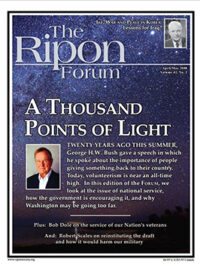
Before 9/11, the draft was a five letter word that no thinking politician would utter in public.
Now, fear of a broken Army is causing politicians of all stripes as well as bureaucrats in the Pentagon to rethink the issue. The draft would fill the ranks with cheap and plentiful men and women. No wonder the idea is gaining ground.
I’ve served in both a drafted and a professional Army. There is no comparison. Professionals make much better soldiers for many reasons. Choosing to serve begins the process of making a soldier a member of a calling, a band of brothers that demands far more from a young man or woman than putting in time. Warfare has become so complex and demanding that just two years of short service is not enough to make a competent soldier. The “Willie and Joe” generation carried a rifle for Uncle Sam. Today’s soldiers are required to fight to be sure, but they also must learn to interact with alien cultures, to be builders, advisors and trainers.
In past wars, soldiers relied on leaders to make key life and death decisions for them. Today, a young soldier standing guard at a checkpoint in Baghdad often must make a split second life altering decision – alone. Wrong decisions have strategic consequences, as we’ve seen so often in Iraq and Afghanistan. Making soldiers good at crisis decisionmaking takes time and requires soldiers who have the “right stuff.” Soldiers like these cannot be massed produced in a few weeks of basic training. Good soldiers like good wine take time to mature. America’s great wartime vulnerability is dead soldiers, and the enemy knows it. Ask any professional soldier and he will tell you that long service professionals fight more effectively and are far less likely to die in combat than amateurs.
Those who call for a renewal of the draft proclaim that the social and racial inequities of the Vietnam era draft would not happen again. The realities of how wars are fought make such pronouncements nonsense. In the two draft-era wars fought since the end of World War II. four out of five service members who died at the hands of the enemy were infantrymen, a group that comprises less than 4% of those in uniform. There is no way that a draft could fairly discriminate between those who are likely to die and those who aren’t. Infantry units in a drafted Army would be comprised overwhelmingly of draftees, most of them poor, disadvantaged and collectively incapable of dealing with the complexities of modern war.
But can we fill the ranks given the reluctance of America’s youth to join in wartime? Yes we can if we are willing to accept a peacetime rather than a wartime system of recruiting:
Pay soldiers for risk as well as skill. Private security firms in Iraq have no problem finding good quality volunteers because they are willing to pay handsomely for the risk. In today’s military, a computer programmer in the Pentagon makes a great deal more than an infantryman humping a 100 pound rucksack in 130 degree Iraqi heat. No wonder infantrymen are hard to recruit and keep. Lately, the Pentagon has tried to solve the problem by offering substantial recruiting bonuses. Bonuses are bribes. Increased pay over the course of a career is an investment. Those who continually go into harm’s way should also be allowed to retire earlier. Selling back three years for each year in a close combat unit would be about right. In such a scheme, an infantry soldier would be able to return to civilian life before his psyche or his body is broken.
Warfare has become so complex and demanding that just two years of short service is not enough to make a competent soldier.
Recruit foreigners. For millennia, great powers have allowed indigenous soldiers in their ranks. To this day. the British Army retains Ghurka regiments from Nepal and the French Army still has its Foreign Legion – both highly respected and competent fighting formations. During the Cold War we recruited special forces soldiers from Eastern Europe and later from Cuba because their intimate knowledge of prospective theaters of war could not be replicated from the general population. We could leverage the power of citizenship as an inducement for filling the ranks with young men who are intimately familiar with places like Africa and the Middle East.
Increase the numbers of close combat soldiers. Recruiting more fighters to retain those whom we need most would give those most likely to die time to recover between deployments to reconnect with their loved ones before returning to combat. More time at home would be a long term investment that would prevent experienced soldiers from voting with their feet.
Were we to be so foolish as to return to the draft we would bring back an Army of amateurs. The Army that we see performing so magnificently in Iraq and Afghanistan would be a thing of the past. Surely a nation of 300 million should be able to recruit and retain the very few long service professionals we must have to fight our wars.
Robert H. Scales spent 30 years in the Army, retiring at the rank of Major General as Commandant of the U.S. Army War College. The author of two books and a senior military analyst for Fox News, he is currently the President of Colgen, LP, a consulting firm specializing in issues relating to landpower, wargaming and strategic leadership.




